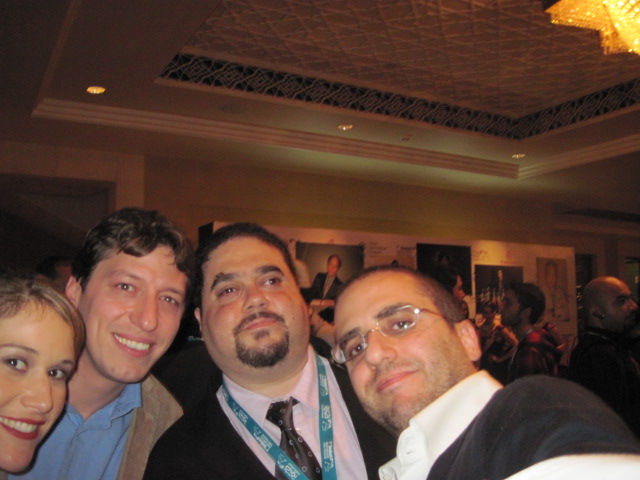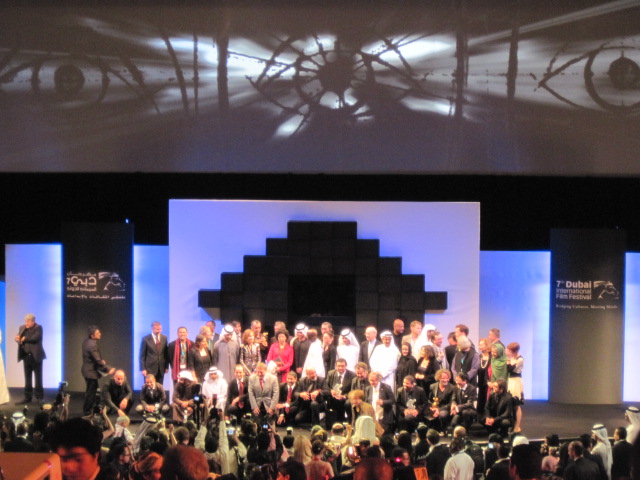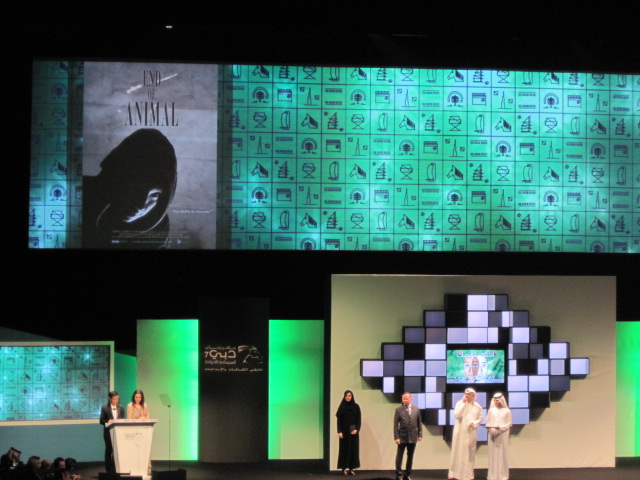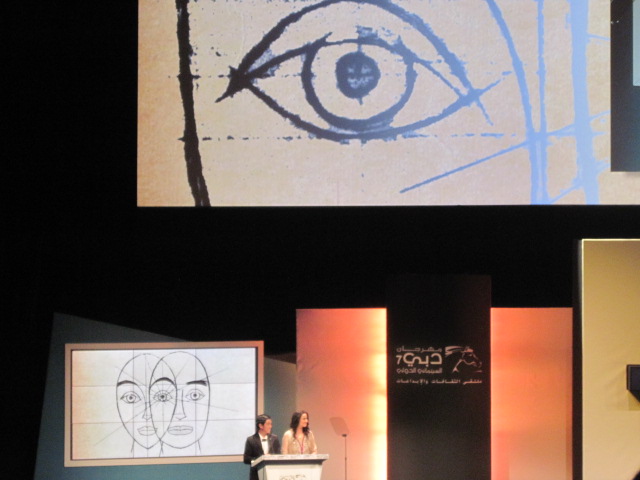Nassim Abassi's 'Majid'
Nassim Abassi, the passionate Moroccan director who made The Winter Sun is a Lie (2005) is here to speak about his new film Majid (2010) MAJID is is expected to be released later this year in Moroccan cinemas and will be the first film project of Nassim's production company 'Moondust Productions'. The film is
about a ten years old orphan boy called ‘MAJID'.
ME: Nassim, this movie is high on my anticipation list. It looks like such a beautiful heartfelt film. Can you speak a little bit about Majid for us and what inspired you to make it?
NASSIM: I started writing MAJID fifteen years ago, during my studies at a film school in the UK and I only finished it three years later. I started looking for funding for it in the UK, thinking foolishly that I may get an English producer interested but I was advised to give up trying as English producers were not interested in a movie to be shot in Moroccan language in Morocco. I was told to try French producers instead but since I was living in the UK, I decided to postpone looking for funds for Majid and started writing English language screenplays set in London.
Concerning the story of MAJID, it's set in Mohammedia, my hometown. It's a coming of age story of a ten years old Moroccan orphan called Majid who works as a shoe shiner in the town's streets. Following recurrent nightmares, he discovers that he can't remember his parents' faces anymore and that there are no photographs of them apart from the charred remains of a family photo with his parents heads burnt away. With the help of his new friend Larbi, an eleven years old cigarettes seller, Majid decides to go on a quest to find a photograph of his dead parents. It's a journey that will take them to the big city of Casablanca where many dangers and adventures await them.
The inspiration behind this movie was diverse but one of the first ideas I had as I sat down to write the script was to tackle a problem that I faced myself and it concerns my own problem of loss of memory, especially concerning my childhood memory which has faded away almost completely.
ME: Wow! I'm absolutely sold. I cannot wait to see this. It sounds like it's a new version of an old classic tale and yet done in such a unique way that will surely show the world the reality of Morocco today. Can you share with us what it was like to finally get this film made and how did you manage to produce it in the end?
NASSIM: The shooting of the film was very difficult as we had to shoot in December because of funding constraints. Most of the film consisted of exteriors, 90% of it. And as it happens, December that year was special in Morocco as it was the first December in years where it has been raining almost every day! It was nightmarish for the film shooting schedule as we had to stop shooting several times and make several changes during the shoot. And if that wasn't enough, we had to cope also with very short days in December as the light would go out at 5pm so we didn't have many hours to shoot considering that the film consisted of 90% sequences in daylight exteriors. I had spent two months before the shoot drawing a detailed storyboard for the whole film and I was sad to let go many of the fancy camera angles and set-ups I had drawn for the movie because of the problems we were facing every day on that
four weeks shoot.
We were not able to shoot the whole film in those 4 weeks as there were few sequences we were not able to do so I decided to do an extra 3 days shoot a few weeks later with a small crew and do the remaining sequences which were crucial to the story. After finishing those intensive 3 days, I checked my storyboards and found out that there were some very important shots still missing so I took the camera myself this time and went out with an assistant and shot the remaining missing shots over the course of a few days.
Concerning the cast, the most interesting challenge I faced was the fact that directing two children, who are the main characters in the film, was a very difficult task especially when they had a fall out and started hating each other on the set while having to play best friends for the movie. The amazing thing for me was to discover that by the end of the shoot they grew up as actors and started acting like true professionals requiring more takes sometimes when they feel they can do it better in another take!
ME: Wow! That's a movie within the movie. I love those behind the scenes stories. I'm sure the tension between the boys made the acting as best friends come off even better. Nassim, you also made a film five years ago. Can speak about your last film The Winter Sun is a Lie?
NASSIM: 'The Winter Sun is a Lie' is my only produced and directed English film. It's a low budget feature film that I wrote after writing three other English features film set in London. Only this one I wrote it to make it on my own with no outside funding and so I did it as soon as the script was ready.
Set in London during the emotional and political aftermath of the recent war and occupation of Iraq, THE WINTER SUN IS A LIE is a quirky drama about lies and liars. The story centers on Fatima, a young British Muslim of Moroccan origin who ran away from her family and now shares a house with two girlfriends in Tottenham, north London. One morning she receives a call from someone claiming to be from the Police. He tells her that there will be a visit later that day to her house to interview her, but refuses to tell her why. The story of the film happens between that phone call in the morning and the 'Police' visit later that day. We follow Fatima during that day as well as other characters related to her who live in the same neighborhood.
The story of THE WINTER SUN IS A LIE was partly inspired by various events I lived through during my thirteen years of living in London as well as a personal take on failed relationships between men and women. Despite its very low-budget, the film actually won the award for best feature film at an international film festival in India.
ME: Awesome! I'm sure that it would have won more awards if it had been released this year as something like over 1500 film festivals take place annually now. You have worked as director, writer and producer in your films. How hard is it to make a film in Morocco today? Can you share with us a bit about Moroccan cinema?
NASSIM: I did two other Moroccan films earlier that were broadcast on national Moroccan television but MAJID is my first Moroccan feature film for cinema and it's also the first Moroccan feature film produced by my own Moroccan production company 'Moondust Productions'. I wrote, directed, produced and edited MAJID. Making films in Morocco is made difficult by the lack of interest from the private sector in this field. If it wasn't for state backed funding, I believe that there would be no Moroccan cinema to speak of. The situation has been made worse over the last few years by the fact that more than half of Moroccan cinemas have closed down over the last ten years. Most cinemas in Morocco are private owned and after many years of neglect and lack of maintenance by their owners, several cinemas
were knocked down to make place for more profitable business like the property business for example. In a way, the state is helping to make more films but there is less and less cinemas where to show these films in Morocco. My
hometown, Mohammedia, with 300000 inhabitants doesn't have any cinemas anymore as the last one, Cinema Miami, was knocked down last year to make way for a new business. Consequently it's difficult to convince private Moroccan investors to invest in Moroccan film production since they don't believe that they can make a profit considering the small numbers of cinema screens left in the country.
ME: Well, that's understandable, but the flip-side is that the rest of the world does want to see good quality World Cinema so many congrats for managing to at last fund your film and see it realized. I truly cannot wait to see Majid and wish you the best of luck with it on the festival circuit. Thanks so much Nassim!
Interview by, Vanessa McMahon on Sep 16, 2010
See detailed information about Nassim and his film on this fabulous article:
http://www.aainaa.com/2010/04/11/da-locum-melioribus/
Nassim Abassi
 Wilcox Alison
Wilcox Alison 



























